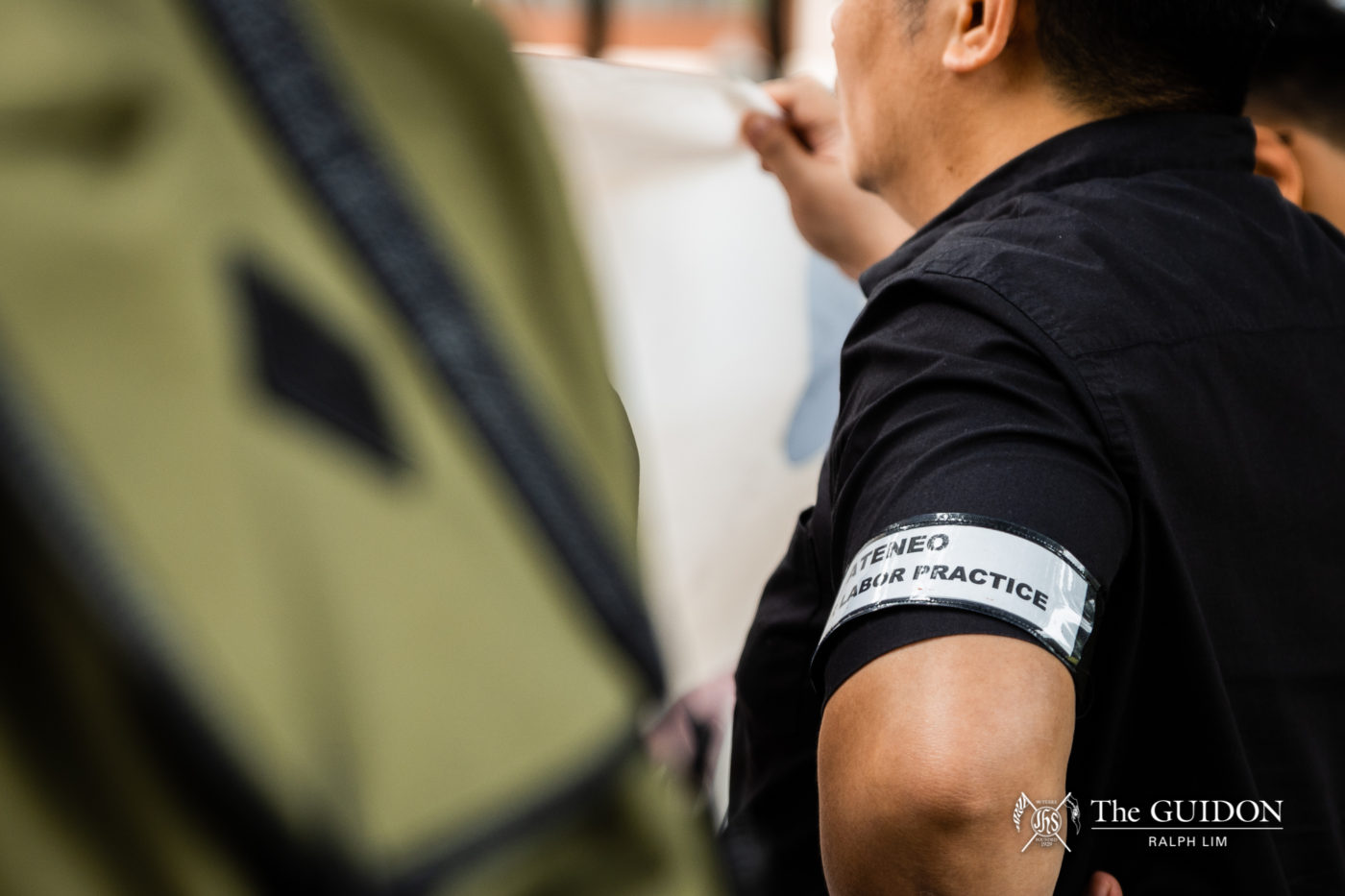AFTER SEVERAL conciliation meetings with the Department of Labor and Employment’s National Conciliation and Mediation Board to thwart labor dispute, the Ateneo Employees and Workers Union (AEWU) withdrew their preventive mediation case after all attempts to negotiate with the administration panel have been futile.
Chairman of the Board Boyet Digos said that AEWU officially filed a notice of strike on December 9. Since then, AEWU has organized noise barrages in and along campus for the 2019-2024 Collective Bargaining Agreement (CBA) which resumed after the expiration of the 2014-2019 CBA last May 31.
At present, AEWU has made demands for the admin to provide the Union with pertinent information, like the total Tuition Fee Increase (TFI) for A.Y. 2019-2020, for a transparent evaluation of the admin’s suggested wage increases in addition to other proposals on the new CBA provisions.
The demands have been met with a refusal from the admin, who claimed to be acting in accordance to Supreme Court (SC) rulings and the Data Privacy Act (DPA) of 2012.
Although both parties have expressed willingness to cooperate, their conflicting interpretations of the law hinder them from reaching an agreement.
The past seven months

An administrative memo dated October 25 said that the 2019-2024 CBA negotiations began in late June 2019. However, AEWU’s statement claimed that these began when the AEWU first submitted their CBA proposals on April 3 of the same year.
According to AEWU Legal Counsel Arturo Tan, the Union submitted their proposals to the admin panel 60 days before the expiration of the previous CBA on May 31.
AEWU proposed an amendment to nearly all articles from the past CBA, with particular focus on the political and economic proposals like Union Rights and Privileges, Job Security and Lay Off, Signing Bonus, Hazard Pay, and Longevity Pay.
Admin panel member Carmela Oracion, PhD, said that on April 8, the admin panel provided the Union with their response. The response stated that they would need more days to review the Union’s proposals which were “a bit far than what we imagined them to be.”
Oracion also clarified that the admin panel had to wait for enrollment figures for the coming school year, which could only be finalized and submitted in late June.
In their counter-proposal, the admin proposed their own schema for tuition hike allocation to the gradual increments of employees and the amendment of certain clauses, such as long-term employment raises.

Demands for wage increase
Among AEWU’s proposals, wage increases seem to be the most contested. In the recent negotiations, AEWU proposed for an annual Php 6,000 or 20% increase in the monthly wages of all of its members effective for 2019-2021.
Should AEWU’s proposed wage increase be translated, the Php 29,612 average monthly salary of the maintenance staff—rank-and-file employees who compose the majority of the Union—would rise to Php 35,612 in 2019, Php 41,612 in 2020, and Php 47,612 in 2021.
However, the admin panel’s counter-proposal for wage increases to the maintenance staff’s average monthly salary is significantly lower than the amount AEWU proposed. Admin panel Co-chair Maria Aurora Bulatao also clarified that the admin’s counter-proposal is only applicable to rank-and-file employees that are part of the Union.
According to Oracion, the admin panel’s proposed wage increases for rank-and-file employees are as follows: Php 350 per month for the first year, Php 450 per month for the second year, and Php 550 per month for the third year. These proposed increases also included a lump-sum performance bonus up to Php 10,000 annually.
If translated, the average monthly salary of the maintenance staff would amount to approximately Php 29,962 in 2019, Php 30,412 in 2020, and Php 30,962 in 2021.
The admin panel explained that AEWU’s proposal is “neither affordable nor sustainable.” They added that it is rare for “non-profit educational institutions like ADMU” to grant wage increases with a double digit percentage. However, both Salinas and Tan refuted this with their interpretation of the University’s financials.
“Every year from 2015, ang kinikita ng Ateneo is more than a million…Tapos walang pera? (Every year from 2015, the Ateneo is earning more than a million. Yet they say they do not have the money?)” Tan said.
According to CBA negotiator Luis Dumlao, PhD, Ateneo’s income for the past three years has been roughly Php 100 million per year. However, he maintained that the school receives zero profit as a non-profit organization because income is inevitably spent on numerous bills.
Dumlao reasoned that the admin panel is “trying to prevent an unconscionable amount of expense.” Meeting AEWU’s demands would entail a tuition increase that would go up to as much as Php 500,000, according to Oracion’s estimate. Oracion added that wage increases that go beyond the distribution of 70% of the Tuition Incremental Proceeds (TIP) might also entail cutting down funds for laboratory equipment, scholarship funds, and faculty salaries.

Recent developments
AEWU has also since accused the admin of “bargaining in bad faith” due to their refusal to provide the total TFI for the current academic year, the projected TFI for the next three years, and the total annual and average monthly salaries of staff from non-union rank-and-file, supervisory, managerial, and faculty positions—information the Union deems necessary to prove the former complied with the Republic Act (RA) 6728 mandate of allocating 70% of tuition increases to employee wages.
On the other hand, Dumlao guaranteed that the admin has been fully compliant with the law in this regard. The admin countered the Union’s claim by asserting that their actions were guided by SC rulings to interpret RA 6728.
According to the school, SC decisions do not prescribe the distribution of 70% of the TIP because the SC has ruled that private institutions have the discretion on the disposition of tuition fee increases, which means the school has a prerogative on the allocation of 70% of the TFI.

Awaiting action
AEWU President Sonny Amata mentioned how retroactivity may ensue due to the negotiation delays, which was expected to finish last November. This means that any negotiation efforts by the AEWU and admin panel will be futile, since retroactivity would mean the existing terms from past negotiations will be implemented for another term.
Tan added that AEWU will still receive an allocation from the 70% of the TFI for SY 2019-2020 based on their current salaries since a percent increase in the TFI would automatically mean an increase in their salaries. He also noted that a deadlock can be resolved, but the Union will not agree to anything less than what they bargained for in their latest proposal.
“No one will agree to something less than what the law promises you,” Tan said.
What do you think about this story? Send your comments and suggestions here: tgdn.co/2ZqqodZ







